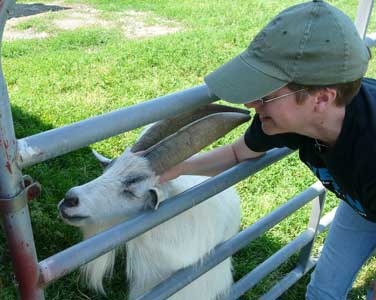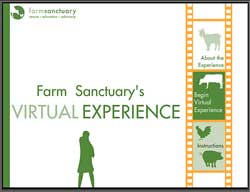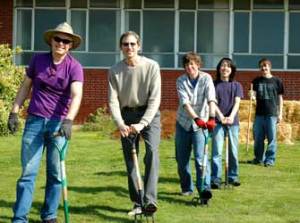
I've admired cows from afar; now I get to show some love up close!
Some of you may have been wondering where the heck all the posts have gone. I’ve been traveling in the Northeast since July 3 (combination of work and visiting family), and have had brief and infrequent Internet access, so my ability to post has been nearly non-existent. But, my time has been well spent. Among other adventures, John (my husband) and I made a pilgrimage to the vegan vatican, Farm Sanctuary in Watkins Glen, New York (near one of the lovely finger lakes).
We’ve been long-time supporters, but have never had the opportunity to actually visit either of the sanctuaries (the other is in Orland, California). So, when our plans took us out east, we knew we had to visit.

This guy loved me because I knew where to find his scritchy "sweet spot."
As you can imagine, it’s an amazing place. Cows, pigs, sheep and goats, chickens, ducks and geese, rabbits and turkeys all have their own luscious spaces to roam, to feed, to snooze, to hang with their friends. Farm Sanctuary makes it clear to visitors that we’re guests in the animals’ homes.
The whole time I was there among the animals, I felt like a giddy kid. I petted cows and scritched goats (their favorite spot is right between their horns, where they can never reach). I gently stroked a turkey’s feathers and got to hug pigs and give them belly rubs. I coaxed kids into feeling the softness of the pigs’ bellies and giving the goats a little scratch. It was heaven!

Not every woman realizes her dream of getting to hug a pig!
While we were there, we went on two of the tours (as I didn’t get in enough cow petting during the first one). And, I’m really glad that we did. During the first tour, our guide (a young intern in her late teens/early twenties) was rather perfunctory in leading us through the different barns to meet the various animals. We spent only a few minutes in each of the barns, and the information she shared was general and given distractedly. Most of the visitors weren’t paying attention; some were talking loudly over what she was saying. It seemed that she was either really unsure of herself, or completely bored with the repetition of doing the tour a gazillion times — just another thing to do as quickly and painlessly as possible. Since I’d never been to a Farm Sanctuary before, I didn’t really have many expectations (other than the hopes of getting to hug animals). But, I was pretty disappointed. The ennui of the tour guide had diminished my enthusiasm for the experience.

A "heritage" breed rescued from an organic farm enjoys his mud bath, and posting for his fans.
Fortunately, we decided to go on a second tour, which happened to have a different tour guide. We were only going to stay long enough to see the cows again (the first stop). We ended up staying for the entire tour. It was a completely different — and amazing — experience. This guide connected with us from the beginning. He was friendly and personable, and took the time to share important information with us. One of the biggest differences in his approach was that, at each barn, he introduced us to several of the animals there and told their stories, thus interweaving the personal life histories of these beings in front of us with the horrors that are unleashed on farmed animals in the U.S. Then, just as importantly, he gave us time to just be with the animals. Both approaches made the tour more meaningful and powerful.
The experience reminded me how important our daily interactions with others are, especially when we’re serving in our roles as advocates. Are we answering people’s questions (you know, those ones we’ve been asked a million times before) distractedly, with a little eye-rolling, or with sincerity and a genuine desire to connect with them? Are we repeating facts about the cruelties and injustices of the world (or going into details graphic enough to make horror director plug his ears), or are we making an effort to share compelling stories and to help people see the issues from a more personal perspective? Are we rushing through, to hurry up and get to the end of the interaction? Or, are we taking time to just be with the people around us and give them time and space to think and explore and inquire?
Every interaction we have with someone can mean a positive experience that brings them closer to making more humane choices, or a negative experience that drives them farther away. We each have the power to help decide which it will be.
~ Marsha
Filed under: advocacy, farmed animals, food and diet | Tagged: advocacy, farm sanctuary, farmed animals, food and diet, power of choice | Leave a comment »
 What’s it like for animals raised in factory farms, and how does that compare to their natural lives? Farm Sanctuary, a farmed animal education and advocacy organization, recently launched Virtual Experience, which is designed to teach the public about factory farming conditions. People can also learn about some of the rescued animals that live out their lives in peace on one of FS’s two sanctuaries.
What’s it like for animals raised in factory farms, and how does that compare to their natural lives? Farm Sanctuary, a farmed animal education and advocacy organization, recently launched Virtual Experience, which is designed to teach the public about factory farming conditions. People can also learn about some of the rescued animals that live out their lives in peace on one of FS’s two sanctuaries.

 People honor anniversaries in different ways. Some throw parties, some go on trips, some buy flowers, some turn within and meditate, some drink copious amounts of liquor….and some ride their bikes 600 miles.
People honor anniversaries in different ways. Some throw parties, some go on trips, some buy flowers, some turn within and meditate, some drink copious amounts of liquor….and some ride their bikes 600 miles.



